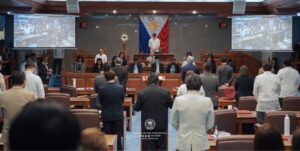By Diego Morra
The Senate decision to archive the impeachment complaint against Vice President Sara Zimmerman Duterte Carpio and freeze any action on the matter until the Supreme Court (SC) rules on the petition for reconsideration to reverse its July 25, 2025 decision that declared the filing of the articles of impeachment was “unconstitutional.”
Certainly, the senators did not bother to ascertain whether the 97-page ponencia of Senior Associate Justice Marvic F. Leonen was based on a correct reading of what transpired from the time three impeachment complaints were filed and then archived until the Lower House crafted its own articles of impeachment, voted on it in the plenary as confirmed the Lower House’s Journal and the videotape of the proceedings recorded by ABS-CBN, thus destroying the very basis of the ruling. The 215 members of the Lower House who signed the articles of impeachment can attest to this along with the reporters who covered the event.
Retired SC Senior Associate Justice Antonio Carpio said the Lower House followed its rules and the articles suffered no infirmity. Only the SC doubted this fact. Former Chief Justice Reynato S. Puno also assailed the High Court’s decision, pointing out that the tribunal set seven rules for the House of Representatives to follow in pursuing impeachment cases, practically dictating processes that the chamber must follow despite the clear intent of the framers of the 1987 Constitution to grant the Lower House the exclusive right to initiate impeachment complaints.
For the 85 professors at the University of the Philippines College of Law who signed a statement on August 1, 2025 criticizing the SC decision, judicial overreach can be smelled from the opening paragraph of the 97-page decision down to the last footnote. Only senators with runny nose and fidelity to the misrule of law and deficit of justice would disagree that the impeachment provision in the Charter was meant to kick out plundering, corrupt and lawless officials and ship them to the doghouse. The impeachment process, argued the UP professors, was crafted precisely to punish erring officials who have lost the people’s trust and confidence, violated their oath, plundered the people’s money and abused their power.
Until the Leonen ponencia, impeachment in the Philippines has been described as a mechanism of political accountability and the process regarded as purely political. For this reason, it is a light year removed from legal accountability through criminal prosecutions. The metrics for evidence, proof of elements and judicial impartiality do not obtain. For nearly a century, the SC respected the process and a raft of decisions, as well as the formal involvement of SC chief justices in the proceedings deferred to the internal rules of the Senate as the impeachment court. Changing the rules midstream is like imposing Calvinball on the prosecutors, the congress members charged with proving the case against respondents, with one party imposing its rules, changing the terrain of the play and the mutable rules assuring the triumph of a favored party, as what Dante Gatmaytan and Cielo Magno wrote for the Philippine Law Journal two years ago.
When the SC changed the terms of play and the rules of the game in Sara Duterte case, it legislated its own requirements on the House of Representatives, which has the exclusive right to file articles of impeachment, and changed the character of the constitutionally-mandated process. This is the argument of the retired SC justices, the UP professors and the public at large. Since the very argument against “irregularities” in the crafting, referral and filing of the articles of impeachment in the SC decision rests on questionable grounds, the only logical option of the court was to revisit its decision, and not fiddle on the workings of the impeachment rules already established by the Lower House.
There is nothing hard in admitting mistakes, and the SC had, for decades, grappled with grievous decisions that had to be overturned. In the US, the best example of injustice becoming part of the law of the land was the Dredd Scott case, in which Chief Justice Roger Taney ruled that slaves cannot own property since they were slaves. Yes, they are equal as Blacks and Whites, but are separate. In the Sara Duterte case, the SC required an oversupply of due process for the respondent, with the Lower House mandated to provide copies of the complaints as well as mountains of accompanying evidence, and provide her with ample time to review the allegations. One can swim in due process but a deluge of it in favor of the respondent drowns prosecutors.
Yet, the Senate found a way out of the troubling issue, albeit temporarily, by shooting down the motion filed by a Duterte ally in the Senate, Rodante Marcoleta, for the chamber to just dismiss the articles of impeachment outright on the basis of the Leonen ponencia. Senate President Chiz Escudero’s ally Sen. Joel Villanueva, rose to the occasion to amend the motion and just archive the articles of impeachment. In short, it will be consigned to the steel cabinet, perhaps to be roused from indecent sleep in February 2026. The motion was carried 19-4, with one abstention. By archiving it, the Senate also gave the SC the best chance to take its sweet time in ruling on the motion for reconsideration of the “final and executory” July 25, 2025 decision. So, they’re still playing Calvinball.




